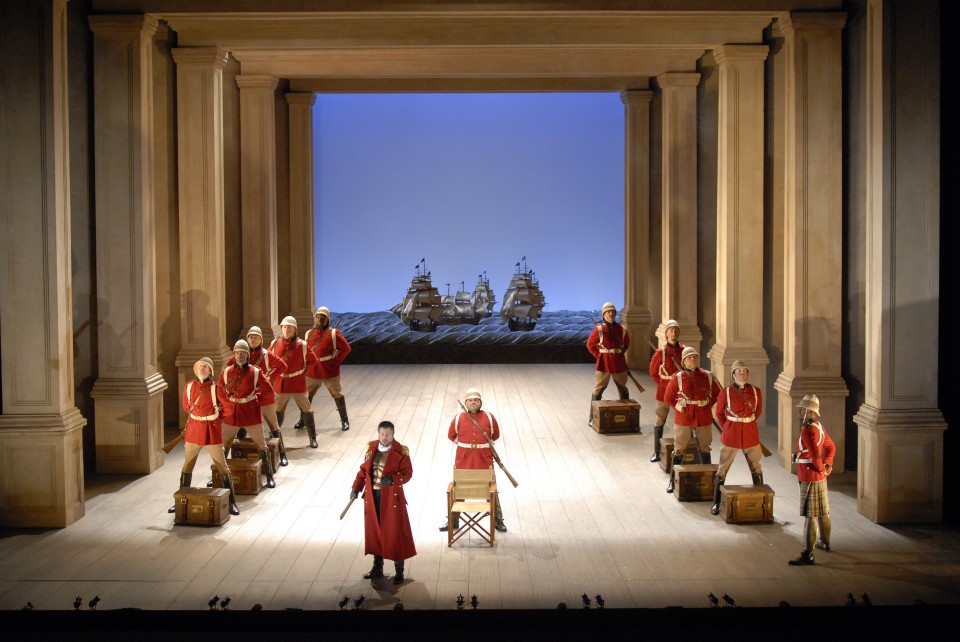Julius Caesar re-invented
Here’s an interesting factoid: our Secretary of Homeland Security, Janet Napolitano, goes to the opera. As I was walking out of the auditorium at the Metropolitan Opera at the end of Handel’s Giulio Cesare yesterday afternoon, there she suddenly was! We had noticed some security personnel during the second interval – their spiral earpieces and their habit of talking to their cuffs are a dead giveaway – but I had innocently speculated that they might have been front of house managers of something of the sort. Once I knew they were Janet Napolitano security detail, I fell to wondering what on earth they had made of the opera.
Even for a seasoned operagoer, it was something out of the ordinary. The production is a sheer delight. It is owned by Glyndebourne Festival Opera, where Sir David McVicar first directed it, and he has placed it at the height of Queen Victoria’s British Empire, complete with red jacketed, pith helmeted soldiers. Caesar’s general Curius was even sporting a kilt! As for the other costumes, Cleopatra’s ranged from Egyptian belly-dancing attire, to Jazz Age flapper, to a military outfit, to a full panniered dress from Handel’s time. For the Alexandrian setting, the simple device of ever rolling horizontal cylinders upstage conveyed the sparkling Mediterranean Sea in the background, with ships of varying types floating across it from time to time, and equally simple columns created perspective for the quickly changing scenes. The action, by turns hilarious and poignant, moves at a rollicking pace, so the four and a half hours seemed to fly by with only a slight dip in Act III, and the choreography, again deceptively simple, is tongue-in-cheek and hilarious.
The biggest challenge from my point of view, and this is nothing to do with the production but everything to do with the strange operatic traditions of Handel’s time, was getting used to the voices. Of the eight cast members, half of them – Cleopatra (the marvelously versatile French soprano, Natalie Dessay), Ptolomy’s general, Achillas (Italian Baritone, Guido Loconsolo), Curius (American baritone, John Moor), and the virtuous Cornelia (Irish mezzo, Patricia Bardon) – were singing with “straight” voices. The other four voices were all unusual to a modern ear. Julius Caesar was sung by American countertenor, David Daniels, (it is sometimes even sung by a mezzo-soprano) and right to the end I couldn’t quite get used to that high tessitura coming out of the manly warrior character. The slime ball, Ptolomy, is also a countertenor role, which was sung by Frenchman, Christophe Dumaux, and that took less getting used to somehow, as did Cleopatra’s confidant, Nirenus, sung by Moroccan countertenor Rachid Ben Abdeslam. Then there’s Cornelia and Pompey’s son, Sextus, played in a movingly gauche way by English mezzo, Alice Coote, whose tessitura was higher than his/her stage mother’s! This mix up of voices is a curious convention, and it is a measure of the huge success of David McVicar’s concept that it all comes off as well as it does.
I want to give a particular shout out to two musicians (all of them under the superb direction of Baroque specialist, Harry Bicket). Concertmaster, David Chan, did an engaging turn as an onstage violinist, fully entering into the spirit of the thing, and Principal Horn, Erik Ralske, did an outstanding job of the prominent horn solo in Caesar’s hunting aria from the first act, Va tacito e nascosto, (It should be silent, sly and hidden). Ralske wasn’t credited in the program and I want to give him full credit here for a flawless and musical performance. Truth to tell, I have loved this aria for years and it was the main reason I wanted to go and see this new version of Giulio Cesare at The Met. I couldn’t be more thrilled to have seen it in context is such an inventive and spirited production! I hope the Secretary of Homeland Security and her bodyguards felt the same.
Tags:Giulio Cesare, Handel, Metropolitan Opera





